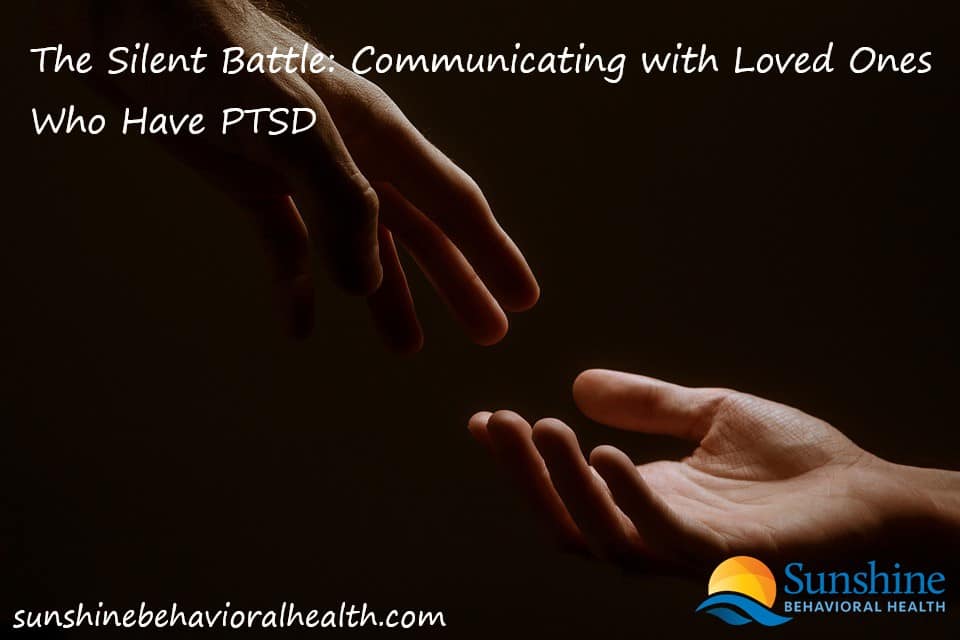
The Silent Battle: Communicating with Loved Ones Who Have PTSD
Post-traumatic stress disorder (PTSD) can be a condition that damages lives. How do you rise above the battle that is PTSD? This PTSD Awareness Month, understand how you can address it and get the help you need.
Trauma can affect people in a myriad of ways. Some people can navigate it more smoothly. Others try to dissociate, and some individuals develop post-traumatic stress disorder (PTSD). This condition is often characterized by vivid flashbacks, changes in one’s mental state, aggression, and even self-harm.
When you’re a family member of someone with symptoms of PTSD, you might feel isolated and confused. You might not know how to help or how to connect with your loved one. PTSD Awareness Month can provide ways to start helping your loved one and yourself.
Listen to people without any hidden intentions
People are often hardwired to listen with other intentions in mind, whether it’s to persuade, judge, or leave an impression, we often listen for self-serving reasons. How often do we listen, just for the sake of listening?
Loved ones who have PTSD are sensitive to our intentions because of what they’re experiencing. In their minds, they may feel as if no one can understand what is happening in their heads and that people only want to bombard them with unhelpful advice.
One of the most effective ways to communicate with someone suffering from trauma is just listening for the sake of it: listening to understand, sympathize, and capture what your loved one is experiencing. By listening without hidden intentions, you open doors for people to be vulnerable and open to finding assistance.
Ask how you can help with triggers
Once people have opened up about their thoughts and feelings, it can also be helpful to ask about managing triggers.
PTSD can be triggered by certain stimuli, such as an event that’s similar to the trauma-causing incident, a picture, sound, smell, or other things. It can be of great help if you ask people how you can assist in managing these stimuli.
Sometimes, it’s not just avoiding triggers but helping people to cope with and respond to unexpected stimuli. Other ways you can communicate your support during struggles and triggers include:
- Expressing that you’re available to listen.
- Reminding people of potential situations where they may experience triggers.
- Telling people ahead of time if a trigger may occur.
- Helping people find ways to relax in situations that may be contributing to flashbacks or other symptoms of stress.
Being mindful of your loved one’s triggers can positively affect how they cope with PTSD.
Give people choices to start finding help
As much as possible, you don’t want to force people into getting help. Treating a dual diagnosis, or a condition that includes a mental illness such as PTSD as well as problem with alcohol or drugs, is easier and more effective when people have the motivation to do so.
If you have a loved one who is ambivalent about finding assistance, don’t force your opinion right away. Instead, you can present options and explain how each one can help. Give people the liberty to choose what they think can work for them, such as seeking counseling, going to rehab, or having a doctor checkup first.
Allowing the space and freedom to choose can make your loved ones feel in control of their actions, paving the way to self-motivation.
Notice and express the small and big victories.
It’s one thing to celebrate your loved one finally quitting alcohol or getting a job after rehab–these are wonderful accomplishments. However, it can be so helpful to also notice their small victories, such as spending more time engaging with others, leaving their comfort zones, or handling a stressful situation well.
Expressing to them that they’re on the right path and showing them that you see them and their accomplishments are ways you can genuinely uplift your loved one, helping them manage PTSD.
Understand your role in the PTSD battle
Family and loved ones can take pride in supporting and encouraging people with PTSD. While navigating PTSD can be challenging, using a few strategies can take your loved one a step closer to recovery.
Sources
sunshinebehavioralhealth.com – Understanding PTSD: A Guide for Families and Friends
experiencelife.lifetime.life – 13 Strategies to Deal With Your Emotional Triggers
sunshinebehavioralhealth.com – Learn About What Dual Diagnosis Treatment Programs Offer
medlineplus.gov – Learn to Manage Stress
A Message From Our CEO
Medical disclaimer:
Sunshine Behavioral Health strives to help people who are facing substance abuse, addiction, mental health disorders, or a combination of these conditions. It does this by providing compassionate care and evidence-based content that addresses health, treatment, and recovery.
Licensed medical professionals review material we publish on our site. The material is not a substitute for qualified medical diagnoses, treatment, or advice. It should not be used to replace the suggestions of your personal physician or other health care professionals.







